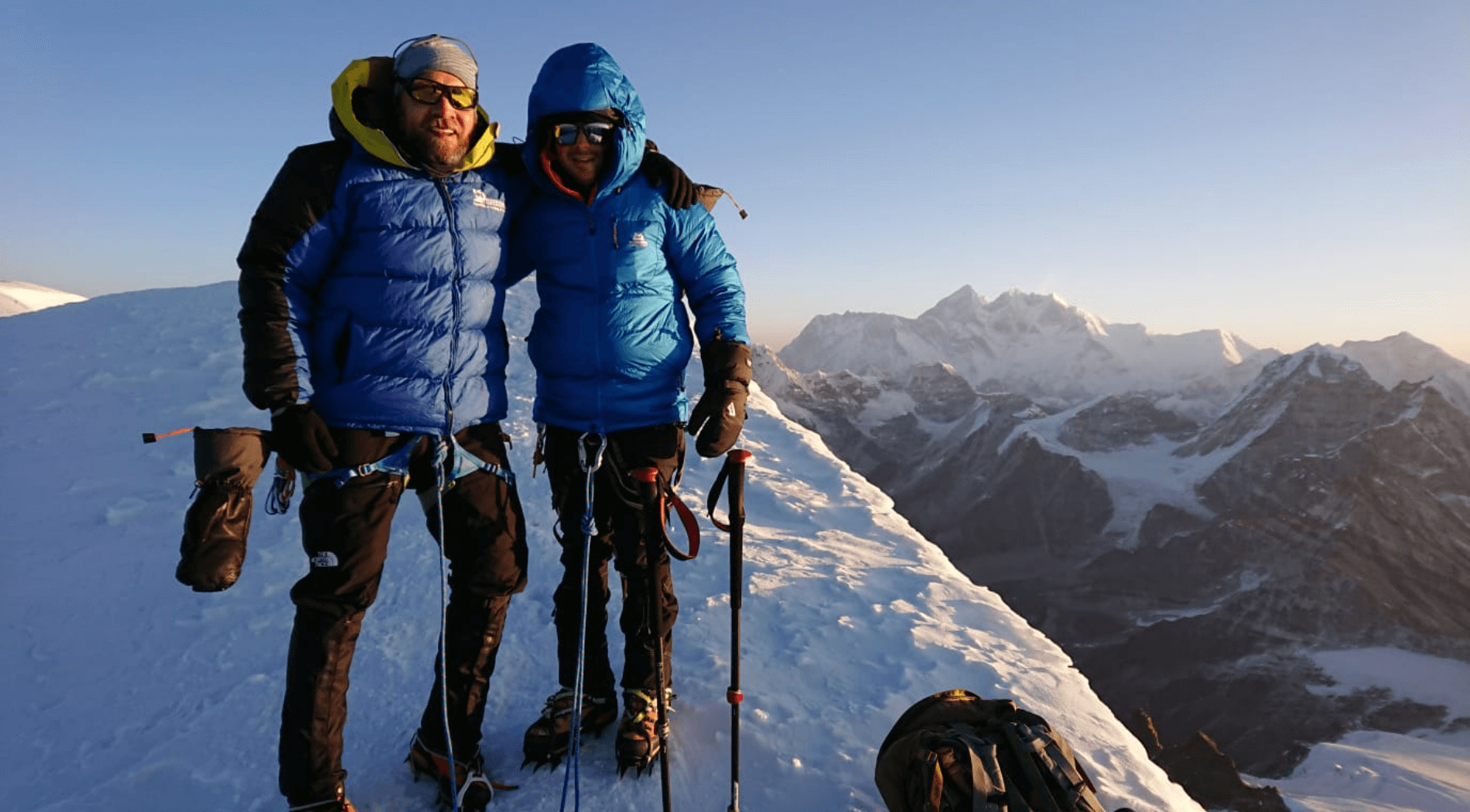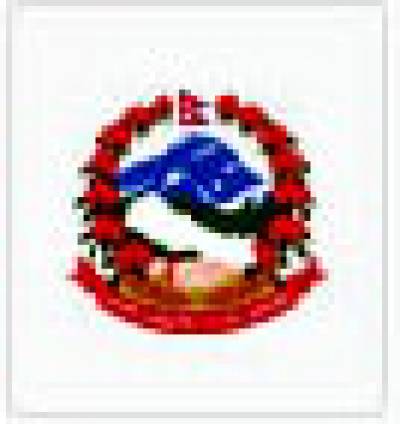MERA PEAK SUMMIT 10 DAYS
This is a chance to go climbing without the necessary permits that most climbing expeditions require in Nepal. Mera Peak fits the bill perfectly and at (6,476m/21,190ft) you will have spectacular views of several 8000m plus peaks, such as Mt. Everest, Cho Oyu, Kanchenjunga, Lhotse, and Makalu. Also on this trek, you will get a good understanding of how the Sherpa villagers’ in this mountainous region live. This climbing expedition has numerous stops at teahouses, overnight camping plus a real climbing adventure within the Sagarmatha (Everest) National Park.
Your journey begins with a short scenic flight to Lukla and trekking through a number of Sherpa villages, conspicuous by their Gompas (monasteries), chortens (engraved stones) and multi-colored Tibetan prayer flags. We will venture along isolated and less trekked trails through the Hinku and Hunku valleys and then head up to Mera Peak Base Camp, summit the peak and return with an adrenalin-pumped experience. Climbing Mera Peak is not considered a technical climb with slopes not exceeding 30 degrees. You will feel safe and secure as fixed ropes will guide you to the summit following in your guide’s footsteps.
Accommodation is in teahouses during the trek right up until we get to Khare where we spend two nights in tented camps with the climbing crew (porters, cook, guide, and group leader). At Khare we will spend time acclimatizing, that is considered essential if climbing to higher altitudes such as Mera Peak. On the second day of the trek we will cross Zatra La Pass which is the most popular route to Mera Peak.
We will then head to Lukla and board a scenic flight back to Kathmandu. This is a great combination of trekking and climbing that takes you to the summit of a sizeable peak – without the bother of obtaining climbing permits. Mera Peak climbing is an ideal choice for anyone with moderate mountaineering experience. The most challenging aspect of this trek is getting acclimatized and then having to cope with reduced oxygen as you head to the summit. You will need only basic climbing skills, which our guide will assist you with before your ascent to the summit.
ITINERARY
Day 1 : Fly from Kathmandu to Lukla and trek to Chhutang [2800m/9184ft] Duration: 3- 5 hours
Today, we will take an early morning scenic flight from Kathmandu to the airstrip in Lukla. Lukla is the gateway to Khumbu and the entire Everest region. From Lukla, we start our trek heading east into the thick forest on the hillside below the Kalo Himal Ridge. There are several trails that head away from the main trail on this section, so sticking to the group is the best option before arriving at Chhutang.
Day 2 : Trek from Chhuthang to Tuli Kharka [4100m/13448ft] Duration: 5-6 hours.
Leaving Chhutang we will follow the trail that gradually ascends and steepens as we head towards the crossing of Zatrawala Pass at 4600 meters. Our tiring climb to the top of the pass is rewarded with magnificent views of Numbur Himal, Kongdi Ri, Karyolang Peak and other surrounding peaks. Our trek goes along a level path for almost two hours before descending all the way to Tuli Kharka.
Day 3 : Trek from Tuli Kharka to Kothe [3580 m | 11,745 ft] Duration: 6-7 hours.
From Tuli Kharka, our trail is a mixture of both uphill and downhill trekking through dense forest filled with rhododendron, oak, pine and juniper trees. During our trek, we will have magnificent views of Mera Peak and surrounding snow-capped peaks. A steep descent to the Hinku River and a final uphill climb will lead us to Kothe. Kothe lies to the west side of the Hinku valley and offers serene wilderness with lush vegetation to trekkers.
Day 4 : Trek from Kothe to Thangnak [4326m/14189ft] Duration: 4-5 hours.
Our trail from Kothe goes along the ridge of the Hinku river towards Gondishung. We will pass through Lungsumgba Gompa which was built approximately 200 years ago. Here we can find Mera Peak along with its route scripted in rock, a fantastic example of rock carving architecture. Our trek continues along a rather easy walking trail that leads to the summer grazing area of Thangnak where there are shops and tea houses.
Day 5 : Trek from Thangnak to Khare [5000m/16400ft] Duration: 3 hours.
Our trail from Thangnak goes over the lateral moraine towards Hinku Nup and Shar Glaciers. From there, the trek involves a steep climb all the way to Khare. We will enjoy the magnificent view of the Northern Face of Mera Peak from Khare. Besides, Khare offers a number of good hikes for exploration and acclimatization.
Day 6 : Acclimatization day at Khare.
Acclimatization is essential in higher altitudes to avoid mental and physical sickness. As we are above the 5000 meters altitude, we will spend a rest day at Khare for acclimatization and exploration. Our Sherpa team will make necessary checks on our climbing gears including ropes, ice axes, crampons, harness, and other equipment before heading further to higher camps.
Day 7 : Trek to Mera Base Camp [5300m/17384ft] 5-6 hours.
Leaving Khare, we start our short but technically demanding trek towards Mera Peak Base Camp. Our trail is a gradual ascend over to the Mera Glacier. We will climb steeply towards the top of the glacier before traversing along the glacier to finally arrive at Mera Peak Base Camp. Once at the base camp, our Sherpa crew will quickly set up the camp and make necessary preparations for further trekking.
Day 8 : Trek to Mera High Camp [5700m/18696ft] Duration: 2 hours.
eaving the base camp, we will follow the trail that climbs over through Mera La Pass and continue trekking along the rocky and often snow-covered trail towards Mera Peak High Camp. Once at the high camp, our Sherpa crew will quickly set up the camps and make necessary checks on our health conditions and climbing gears. From the high camp, we can enjoy amazing views of Everest, Makalu, Nuptse, Cho Oyu, Baruntse, and Chamlang.
Day 9 : Summit Mera Peak (6,461m/21,1907ft) and back to Khare (5045m/16,547ft) And Fly back to Lukla by Helicopter Duration: 8-9 hours.
This is the day we have all been waiting for as we head to the summit. We will be up real early in the morning order to reach the summit with time enough to return to High Camp and Khare. The early morning light on the snow-covered peak is dazzling. From the summit we have some awesome views of Mt. Everest (8,848m), Cho-Oyu (8,210m), Lhotse (8,516m), Makalu (8,463m), Kanchenjunga (8,586m), Nuptse (7,855m), Chamlang (7,319m), Baruntse (7,129m) and other massive peaks. We will then return to Khare for the night.
Day 10 : Fly back to Kathmandu (1,350m) Duration: 30 Minutes flight.
Today we have an early morning scenic flight from Lukla back to Kathmandu. You will be taken back to your hotel in Thamel where you can stroll around its narrow streets or visit some of the historic sites in Kathmandu Valley.
SERVICES
Costs included in your package.
- Domestic Airport picks up and transports by private Car/Jeep.
- Three meals a day (Breakfast, lunch, and dinner) during the trek.
- Fresh fruit every evening after dinner.
- Shared Helicopter from Khare to Lukla
- Trekking Lodge (Tea House) during the trek and tent camp accommodation during climbing session.
- All necessary paperwork including Makalu Barun National Park Pemit Entry fees.
- Kathmandu-Lukla-Kathmandu (Ramechhap -Lukla- Ramechhap) flight with private airport transfer and domestic airport tax.
- A highly experienced, helpful, knowledgeable, friendly, English speaking well trained, Government license holder guide with all his salary, food, drinks, accommodation, transport and insurance.
- Climbing permit of Mera Peak.
- Strong, helpful Sherpa porters with proper safety equipment and walking equipment, his salary, food, accommodation, and insurance (one porter for two people).
- Comprehensive medical supplies (first aid kit will be available).
- Arrangement of emergency helicopter service (paid by your Travel Insurance Company).
- Use of sleeping bag, down jacket, duffel bag and walking poles (if you don’t have your own, to be returned after trip completed).
- Sherpa Expedition and Trekking T-shirt
- Government taxes and official expenses.
- Trip achievement certificate after successful trip completion.
- Oxygen meter to check your pulse and oxygen saturation and heart rate twice daily (Very useful to check Altitude Mountain Sickness(AMS) symptoms) which will ensure your health during the trek.
- Assistant guide for groups of 8 or more people.
Costs Exclude
- Meals whilst you are in Kathmandu - lunch, and dinner.
- Hotel accommodation in Kathmandu
- Nepal entry visa fee (easy to obtain the visa on arrival at Tribhuvan International Airport – Kathmandu). $30 USD for 15-day, $50 USD for 30 Days, and $125 USD for 90 Days visa.
- Personal travel and medical insurance.
- International airfare.
- Your personal expenses.
- All the alcoholic and nonalcoholic, soup, tea, coffee, hot chocolate, cocoa, mineral water, extra food, cold and hot drinks on trek ( i.e. those you choose to purchase along the way and during evenings in the tea houses)
- All desserts & sweet things like chocolate, cake, pie, pudding.
- Hot shower and battery charging at the tea houses.
- Tips for the guide, porter, and driver (tipping is expected)
- Excess baggage of more than 10 kg for Lukla flight.
- NOTE: If you return earlier from the trek due to sickness or any problem, the money you paid for the flight, hotel, mountain room, food, etc. is nonrefundable, and you will need to bear the expenses for the hotel, food, etc. in Kathmandu yourself.
EQUIPMENTS
You will be carrying all of your gear and share some of the cluster gear. Keeping your pack light is important, so choose light-weight clothing and equipment. Be sure to have a range of clothing suitable for all conditions. Sudden change of weather may require layering of clothing. Three layers will meet your needs. Avoid cotton or fabrics that do not maintain heat when cold. Comfortable durable wool (or proven fabrics) that breathe and expel sweat lends itself to an additional pleasant experience!'
We will offer complimentary water and a windproof duffle that you'll use on the trek - carried by porters. The duffle is yours to keep once at the end of the trek. You can safely leave your bag, together with your non-trekking requirements, at our office in Katmandu and collect them upon your return.
All equipment, such as base camp tents, room accessories, climbing rope, ice screws, snow bar and ice hammer is provided by Sherpa Expedition & Trekking.
Upper Body:
- Base Layers: Moisture-wicking and quick-drying shirts and thermal tops.
- Insulation Layers: Fleece or down jackets to provide warmth.
- Waterproof Shell Jacket: A durable and breathable jacket to protect against wind and rain.
- Softshell Jacket: A lightweight and water-resistant jacket for added protection.
- Climbing Harness: A comfortable harness to secure yourself to the rope.
- Helmet: A strong and well-fitting helmet to protect your head from falling objects.
- Gloves: A combination of lightweight liner gloves and insulated gloves or mittens for warmth and dexterity.
- Buff or Neck Gaiter: To protect your neck and face from cold and wind.
- Sunglasses: Polarized and UV-protected sunglasses to shield your eyes from the sun and snow glare.
- Goggles: Ski or mountaineering goggles for added eye protection in extreme weather conditions.
Lower Body:
- Base Layers: Moisture-wicking and quick-drying thermal bottoms.
- Insulation Layers: Fleece or insulated pants for added warmth.
- Waterproof Shell Pants: Durable and breathable pants to protect against wind, rain, and snow.
- Softshell Pants: Lightweight and water-resistant pants for added protection.
- Mountaineering Boots: Sturdy and insulated boots designed for snow and ice.
- Crampons: Attachable spikes that provide traction on icy terrain.
- Gaiters: Waterproof and breathable gaiters to keep snow out of your boots.
- Socks: A combination of moisture-wicking liner socks and thick, warm mountaineering socks.
Other Essential Items:
- Backpack: A spacious and sturdy backpack to carry your climbing gear and personal belongings.
- Sleeping Bag: A warm and lightweight sleeping bag that can withstand sub-zero temperatures.
- Trekking Poles: Adjustable trekking poles for added stability and support.
- Headlamp: Essential for climbing in low-light or dark conditions.
- Water Bottles: Insulated water bottles to keep your water from freezing.
- Sunscreen: High SPF sunscreen to protect your skin from the strong sun at high altitudes.
- First Aid Kit: A comprehensive first aid kit with essential medications and supplies.
- Climbing Snacks: Energy bars, nuts, and other lightweight snacks for quick fuel during the climb.
It is important to invest in high-quality gear and ensure that everything fits properly and is in good condition. Additionally, consult with experienced climbers or a professional guide to ensure you have all the necessary gear and receive proper training on how to use it effectively and safely.
GOOD TO KNOW
Mera Peak is one of the popular trekking peaks in Nepal, standing at an elevation of 6,476 meters (21,247 feet). Here are some important details about Mera Peak climbing:
1. Location: Mera Peak is located in the Khumbu region of Nepal, in the Solu-Khumbu district. It lies in the vicinity of the Everest region.
2. Difficulty Level: Mera Peak is considered a moderately difficult climb. It requires a good level of physical fitness and previous trekking experience is recommended. Some technical climbing skills may be required, especially towards the summit.
3. Permits: As with any climbing expedition in Nepal, you will need to obtain climbing permits. For Mera Peak, you will need a climbing permit issued by the Nepal Mountaineering Association (NMA) and a Sagarmatha National Park permit.
4. Route: The most common route for Mera Peak climbing is the Mera La pass route. The journey begins with a flight from Kathmandu to Lukla, followed by a trek to Mera Peak Base Camp via various villages like Paiya, Pangkongma, and Khare. The summit push is usually made from High Camp (5,800 meters).
5. Duration: The typical duration for Mera Peak climbing is around 18-20 days, including acclimatization days and trekking to and from Lukla.
6. Accommodation: During the trek, you will stay in teahouses or lodges available in the villages along the route. However, at higher altitudes, you will need to set up tents for camping.
7. Best Time to Climb: The best time to climb Mera Peak is during the spring (March-May) and autumn (September-November) seasons. These months offer stable weather conditions and clear views of the surrounding mountains.
8. Safety: Climbing Mera Peak requires proper acclimatization and preparation. It is advised to climb with an experienced guide or join a reputable trekking agency that provides experienced guides and necessary equipment.
9. Equipment: Some essential climbing equipment required for Mera Peak climbing includes crampons, ice axe, harness, helmet, ropes, and proper clothing suitable for high altitude conditions. It is recommended to rent or buy these items in Kathmandu before starting the trek.
10. Fitness Requirements: Good physical fitness is essential for Mera Peak climbing. Regular cardio exercises, strength training, and hiking in similar terrain can help prepare your body for the climb.
Remember, Mera Peak climbing is a challenging adventure that requires proper planning, preparation, and guidance. It is always recommended to consult with experienced climbers or trekking agencies for more detailed and up-to-date information.
MAP
PHOTOS/Videos
Departures
Select a departure month
Fill out the form below and a Travel Expert will reach out to create your perfect tour.
Latest Traveller’s Reviews
Travel experiences of our clients who recently returned from their trips.
100%
Based On 7 Reviews
Mirek Jeżewski
Denmark
November 3, 2023
A true sense of camaraderie
The Mera Peak Summit 10-Day trek fostered a true sense of camaraderie among the trekkers. We formed bonds and supported each other throughout the climb, creating lasting memories and friendships. It was a wonderful group dynamic that added to the overall experience.
Eila Jokinen
Australia
August 30, 2023
Well-organized and professional
The Mera Peak Summit 10-Day trek was well-organized and professional from start to finish. The guides and support staff were knowledgeable and ensured that everything ran smoothly. Their expertise and attention to detail made the trip enjoyable and worry-free.
Nancy Gilbert
Australia
June 29, 2023
A challenging yet rewarding climb
The Mera Peak Summit 10-Day trek offered a challenging yet rewarding climb. The ascent was physically demanding, but the feeling of accomplishment upon reaching the summit was unparalleled. It was an incredible test of endurance and determination.
People Considering This Package Right Now Check availability
























